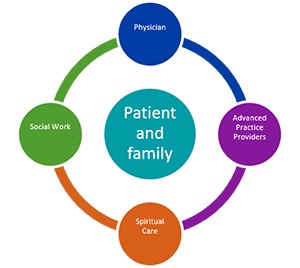There’s a national programme that trains clinical nurse specialists in palliative care by the Ghana College of Nurses and Midwives, which began in 2015- they’ve graduated 3 sets so far and it’s gaining popularity
We should guard against thinking of palliative care as just end of life care and “dumping” patients who are considered terminal on palliative care teams/units.
Palliative care seeks to improve quality of life by preventing and relieving suffering and is not just based on prognosis, but in need, across the entire illness trajectory.
It is a basic skill that all physicians and surgeons need to have in this era, since cancers and other serious illnesses, mainly NCDs, are major causes of morbidity and mortality in hospitals.
Unfortunately, it is not a mandatory part of the undergraduate curricula for medical schools in Ghana. So far, only 3 medical schools feature lectures in palliative care in their curricula and only 2 or so allocate clinic time to final year medical students to be exposed to palliative care teams. Yet in every clinical rotation, they all agree they have seen patients with clear palliative care needs.
All family medicine trainees rotate through palliative care during their membership training but other specialists don’t.
All clinicians should be able to provide basic palliative care as a matter of necessity. Once integrated into everyone’s daily practice at all levels of health care, management of patients will improve.
Patients live in communities. To be effective, we need community based palliative care available at the district or even CHBS level, where Community Health nurses and PAs work together with PC teams led by Family Physicians/other trained physicians and/or Clinical nurse specialists, together with trained nurses, clinical psychologists and pharmacists; who would liaise further with the specialist palliative care teams based at regional and teaching hospitals.
This way referrals can be made across all levels of the healthcare system, in either direction as needed, based on the patient’s or family’s circumstances and needs.
All these require funding- the NHIS would have to make provision for home visits, provision of medical equipment for bedridden patients, medications for symptomatic treatments etc.
The GCPS has an interdisciplinary fellowship in Palliative Medicine which is run by the Faculty of Family Medicine but open to all clinicians with a Membership in a clinical discipline- Surgery, Anaesthesia, Oncology, Child Health, Internal Medicine, Psychiatry, Emergency Medicine, Urology, etc. We need more physicians to become Palliative Physicians so that we can train more people to provide basic palliative care ( pain management, symptom, management, communicating about serious illnesses, setting goals of care; advance care planning; recognize and initiate appropriate care for spiritual and psychosocial needs; and providing good end of life care.
This is good medicine, which when practiced by all, will improve satisfaction with healthcare.
Dr Edwina Opare-Lokko; Family/Palliative physician
Shared with permission

